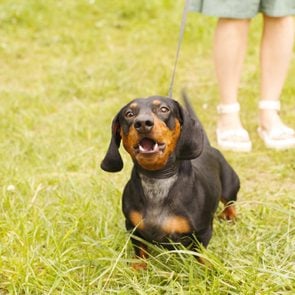How to Keep Dogs Out of Your Yard
Updated: Jan. 27, 2024
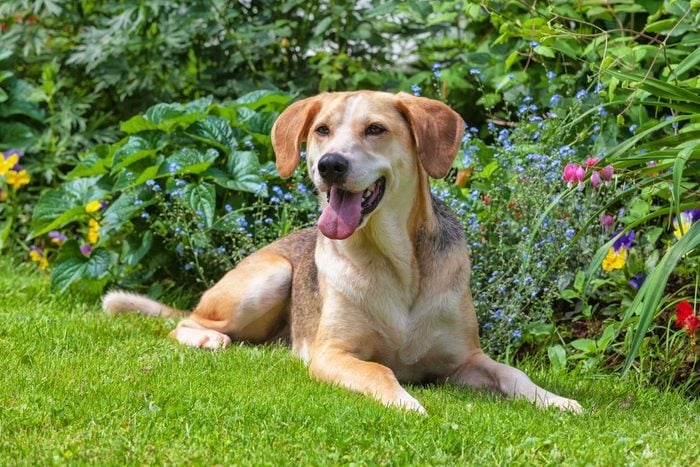
Struggling with unwanted canine visitors? We have 16 expert-recommended strategies for keeping dogs out of your yard.
No matter how you feel about yard work, you know there are a multitude of things to think about when it comes to maintaining your backyard oasis. Maybe you’re making your lawn a magnet for pollinators (and saving yourself some time) by ditching mowing altogether. Or maybe your plans lean more practical: creating the best cornhole setup ever. Either way, thinking about how to keep dogs out of your yard may not be your top priority.
After all, keeping your yard looking good is an ongoing struggle, with pests and weeds at the forefront. But if you have pets, or if there are free-roaming animals in your neighborhood, it adds a whole new set of complications. That pup down the street is adorable until you find her digging in your yard—or worse. There are only so many books about how to train a dog or how to train a puppy that you can leave on your neighbor’s front porch!
Dog commands don’t work on just any pooch, and you may be worried about backyard dog dangers like plants toxic to dogs. Short of moving to an apartment, how do you keep dogs out of your yard? We spoke to gardening and pet experts and identified some gentle but effective solutions to keep dogs off your lawn.
Get Reader’s Digest’s Read Up newsletter for more pet insights, humor, cleaning, travel, tech and fun facts all week long.
Why should you keep dogs out of your yard?
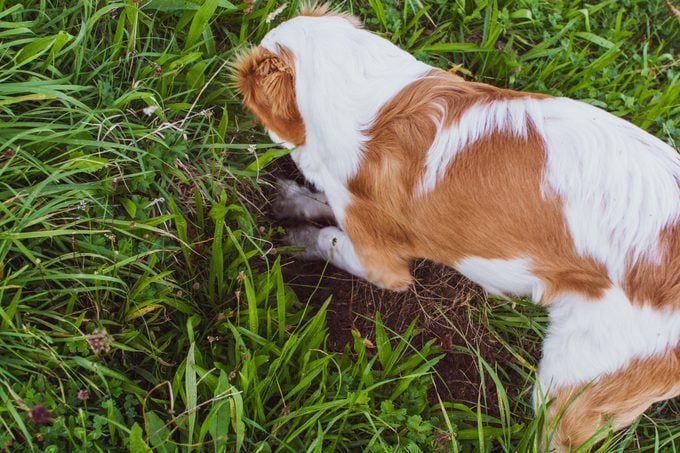
If you’re feeling rather skeptical about the whole issue, we get it. Dogs are adorable! Who wouldn’t want a furry little friend stopping by from time to time? But there are good reasons you should learn how to keep dogs out of your yard. Animal experts bring up three main points when talking about the reasons you may not want dogs wandering on your lawn.
They could damage property
We spoke to Zack Keithy, a veterinary technician and chief editor at Daily Dog Drama to find out what you might expect from unwanted canine visitors. You’re likely to see a dog rolling around on the grass, but it doesn’t stop there.
Dogs might dig holes in your lawn or garden beds, or they may chew patio furniture or hoses. An excited dog racing around could knock over garden art or birdbaths, which poses a risk to them as well.
They might use your yard as a bathroom
Dogs do as dogs do, and no one wants to step in doo-doo in their own backyard. A dog urinating in the same spot can kill your plants or lawn over time as well, and nothing creates extra yard work like a dead patch of grass.
They may pose safety issues
One of the reasons it’s important to keep dogs out of your yard is that you may have no information about those animals. Doggy strangers may be carrying diseases that could harm you or your own dogs. Or they could be aggressive toward your family and pets.
If you have a swimming pool or garden plants that are toxic to dogs, they also pose a risk to any curious pooch. Plus, any holes in your lawn are a serious tripping hazard.
How to keep dogs out of your yard
So, you understand the importance of keeping canine visitors away. But that raises the question of how to keep dogs off your lawn. Thankfully, there are plenty of strategies to try, from physical dog deterrents to plants and natural scents. Read on for approaches that are safe for both you and curious pooches.
Physical deterrents
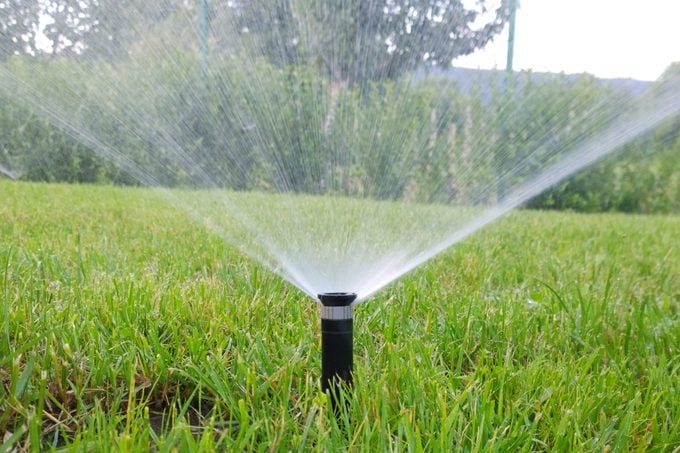
An easy way to keep dogs off your lawn is to use an item that will physically repel dogs. The options below are all great places to start.
Bamboo stakes
By planting rows of bamboo stakes in your garden, you can form a barrier and keep dogs out. The stakes will make navigation between plants difficult for dogs too.
How to do it: Insert bamboo stakes into your garden beds, placing them close together—about 6 to 8 inches in between—to help deter digging. They don’t need to be too tall; aim for stakes that are no more than a foot.
Chicken wire
Laying chicken wire over the soil between plants is a great deterrent when it comes to dogs digging holes in your garden.
How to do it: During planting season, cut strips of chicken wire and lay them on the soil between your plants. To give your garden a boost, cover the wire with mulch—it’ll help your plants and the soil too.
Cover crops
A cover crop of sedum makes the soil hard to access, and that’s not just a good thing for dogs that like to eat dirt. Sedum plants also make it hard for dogs to dig. Even the most motivated pups are no match for a ground-spreading plant, and they eventually give up.
How to do it: Sedums are best planted in early spring, in areas with full sun. They’re extremely drought-tolerant plants, so they won’t require much looking after once planted—except for the necessary trimming to stop them from spreading all over your yard.
Motion-activated sprinklers
If finances and space allow, motion-activated sprinklers can be a great solution. The noise is a surprise, and the unexpected stream of cold water usually isn’t welcomed by anyone, let alone a dog.
How to do it: You’ll need an extension cord, an AC motion sensor and a sprinkler unit. Setting up the system is a bit complicated, but you can call in a professional if you’re serious about this form of deterrent. One major caveat: If your garden is close to the road, avoid this method. You don’t want surprised dogs running into the street.
Fences or hedges
Depending on the size of the dog (or dogs) you’re trying to deter, fencing off the area you want them to avoid may be the most effective solution. It’s certainly the most permanent.
Another great option for enclosing your yard (and keeping it dog-free) is a hedge. Hedges block sound as well and provide privacy, and choosing the right native species can boost biodiversity in your yard by giving birds places to nest. Plus, your yard will be much cooler with a green fence around it!
How to do it: Plant a dense row of shrubs along the perimeter of your yard. Or instead of this hedge, construct a fence around the area. Small dogs mean you can get away with a smaller (and cheaper!) fence, but even big dogs may not access your yard if the fence is high enough to block their view.
Plant deterrents

You may find it hard to believe (because those sneaky dogs are munching on your garden), but certain plants can actually deter dogs.
Marigolds or calendula
Dogs usually find the pungent odor of marigolds and calendula (commonly known as pot marigold, although the two plants are not related) unpleasant. And they’re not the only ones. “As a couple of added bonuses, many harmful insects avoid marigolds, and you also get some extra color,” says gardening expert Erinn Witz.
How to do it: Witz recommends planting marigolds or calendula—or both—around access areas to your property.
Herbs
Dogs’ impressive sense of smell is well known, and it’s something you can use to your advantage to keep dogs out of your yard. All you have to do is plant some pungent herbs. If they smell strong to us, imagine how they smell to your pup!
How to do it: Plant herbs like rosemary, lavender, lemongrass and lemon thyme in your yard. All deter animal visitors.
Natural scent deterrents
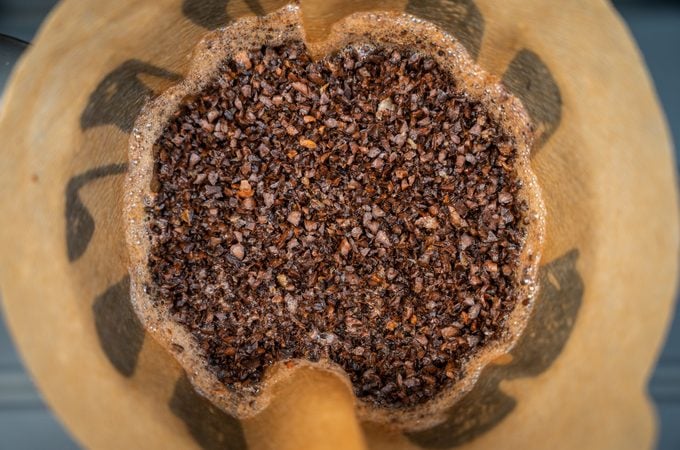
Wondering how to keep dogs out of your yard without resorting to chemicals? Look no further than some natural dog-deterring items.
Vinegar-soaked rags
Gardener Jeremy Starke calls vinegar an extremely effective deterrent. By using it in your garden, you can keep canine explorers from nibbling on your plants or treading on your prized petunias. (Psst! Used at full strength, vinegar can kill weeds too.)
How to do it: Starke recommends soaking old rags in white vinegar and tying them to stakes around your garden, particularly around any access points. Give the rags another vinegar soak every couple of weeks to maintain the effect.
Citrus spray
Dogs hate the smell of citrus, so you may come across the advice to lay orange, lemon or grapefruit peels down in your garden. But dogs really shouldn’t eat citrus fruits. Besides, as veterinarian Georgina Ushi Phillips, DVM, points out, this trick is only a short-term solution—the smell likely won’t last.
Fortunately, our garden experts were on hand to help. They recommend mixing up a citrus solution instead.
How to do it: Mix about 1 tablespoon of lemon juice with 1 cup of water (anything else might hurt your plants) in a spray bottle. Then spritz the citrus water around your garden, hitting any access points.
Coyote urine
This effective (if pungent) tip comes from Elle Meager, CEO of Outdoor Happens, who says that coyote urine is available both online and in hardware stores. She suggests using it on your lawn as a scent deterrent.
How to do it: Splash some around the perimeter of your yard to ward off doggy visitors. (Speaking of No. 1, here’s why dogs kick up the lawn after they pee.)
Coffee grounds
The strong scent of coffee may be a lure for groggy humans, but it can deter animals. That’s why coffee grounds are a great choice for keeping dogs out of your yard. As an added benefit, coffee grounds are great for plants.
How to do it: Make the most of your daily java by sprinkling brewed coffee grounds at access points and in any vegetable or flower beds. The strong smell will keep pets away.
Pepper
Black pepper and cayenne pepper work wonders when it comes to deterring doggos. And whipping up a simple yet peppery solution is easy as pie.
How to do it: Mix cayenne pepper and water in a spray bottle, then spritz the mix around your yard to keep it dog free.
What not to use to keep dogs out of your yard
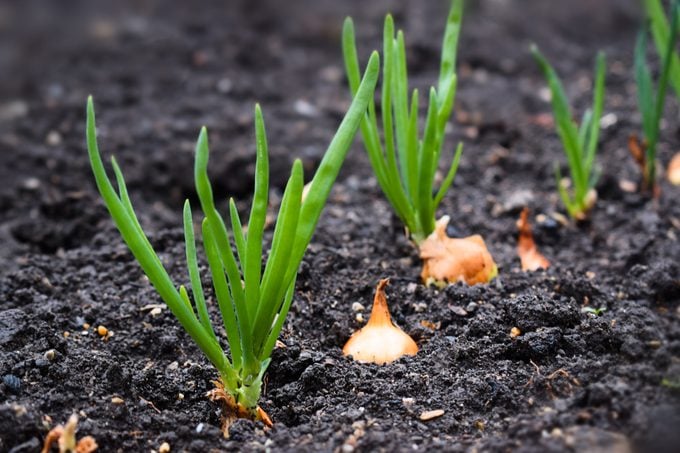
As you learn how to keep dogs out of your yard, keep in mind that some so-called solutions aren’t your best option. You’re better off avoiding the three methods below.
Essential oils
Dr. Phillips has a rule: no essential oils in the garden! “Essential oils are extremely toxic to both dogs and cats and should be avoided,” she says. “Even diluted in water, I still can’t safely recommend essential oils as a deterrent for pets.”
Gravel and pine cones
While adding things like gravel and pine cones to the soil will make the ground less comfortable for some dogs, Dr. Phillips notes that there are “plenty of dogs that will happily plop down on a prickly pine cone as if nothing is out of the ordinary.” That’s the kind of dog behavior we’re trying to avoid!
No, these items aren’t dangerous for your pooch. But there are more practical solutions to keep dogs out of your yard.
Onions
Turns out, onions don’t just make humans cry—they harm pets too. Sarah-Jane Molier, BVM&S, a veterinarian with Miss Cats, notes that many people use chopped onion to deter animals from their yard, but the stinky veggie is actually one of those foods your dog should never eat. “Onion should never be used as a deterrent, as it is poisonous to dogs,” she says.
Consider the food a major no-no in the garden. And stick to one of the other solutions on this list.
What to do if dogs won’t stay out of your yard
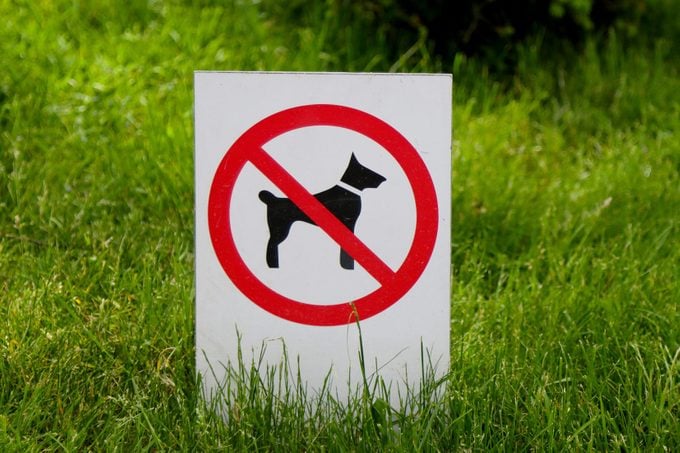
You’ve tried all the expert tips on how to keep dogs out of your yard, yet some smart pooches keep finding their way in. If you’re at your wit’s end, try one of the last-ditch efforts below.
Talk with neighbors
If a neighbor’s dog is repeatedly entering your yard, it’s time to have that awkward conversation. Go into it knowing that they most likely don’t even realize their dog is being a nuisance.
You might be tempted to write them a note, but that can come off as passive-aggressive or unfriendly. Knock on their door instead and see if they’re open to a conversation. Maybe you can fix the hole in their fence together—and you’ll have made a new friend in the neighborhood.
Install a sign
Something as simple as a sign could help keep your yard clean and canine free. Keithy recommends installing a sign that indicates a dog-free zone to deter owners from letting their dogs roam in your yard.
Keep your trash bin sealed
There’s a simple trick that keeps raccoons and other critters out of your yard, and it works for pooches too: Keep your trash bin sealed so animals won’t be attracted to the smell of last night’s dinner and won’t wander into your yard for a closer look.
Training
Many of our experts emphasized the importance of training and redirection when it comes to keeping your own dog out of the garden. Dr. Phillips suggests a neat solution for dogs that love to nap in the soil: “Give them a better spot to lay that’s near the garden, and give them plenty of praise and treats when they use it.” If your dogs love to dig in the garden, you can try “adding a small fence, and give them somewhere else that’s appropriate to dig,” she says.
To keep dogs off your lawn, follow the three steps: divert, distract and give treats!
About the experts
- Georgina Ushi Phillips, DVM, is a practicing veterinarian, as well as a writer and editor who contributes to animal-care sites such as Better with Cats and Not a Bully. In her free time, Dr. Ushi spends time with her hound mix, Pearle.
- Sarah-Jane Molier, BVM&S, is a veterinarian who’s worked in a variety of small animal clinics, including for charity. She now helps manages her practice while raising a family and looking after her cat and dogs. She contributes to animal-focused sites such as Miss Cats.
- Jeremy Starke is a vegetable gardener and founder of the Green Thumb Gardener blog and Youtube channel. There, he helps educate gardeners from all walks of life.
- Elle Meager is the founder and CEO of Outdoor Happens, where she shares her passion for self-sufficiency, gardening, animal rearing, off-grid living and many other homesteading topics.
- Erinn Witz is the gardening expert behind Seeds and Spades, where she explains the basics of gardening to gardeners of all skill levels.
- Zack Keithy worked as a certified veterinarian technician for six years and is now chief editor at Daily Dog Drama, a dog-care resource for pet owners.



